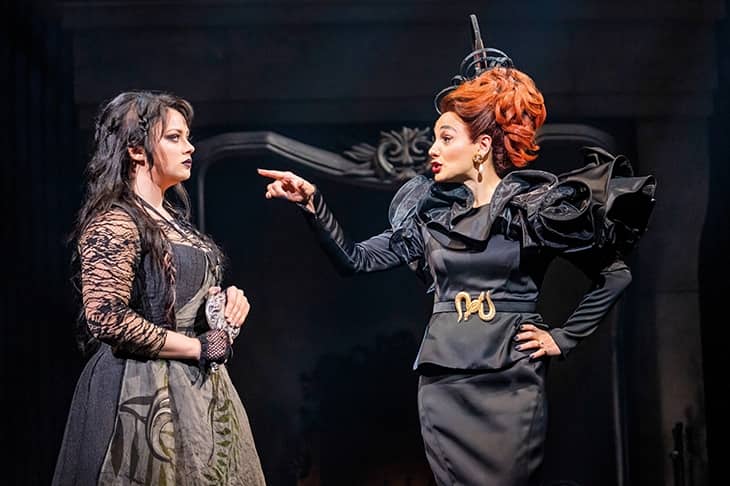It’s a rum beast the new Andrew Lloyd Webber musical. Cinderella is set in Belleville, a European city of 18th-century vintage, whose inhabitants are fixated with the body beautiful. Cinderella, a pasty Goth, rejects this ethos and vandalises a statue that commemorates a handsome prince who recently died in battle. Cinders is punished by being chased into a forest and tied to a tree but she’s rescued by her best friend, Prince Sebastian, who will inherit the throne as soon as he marries. Sebastian and Cinders are pals whose friendship is destined to blossom into romance. They can’t see this. We can. And that’s the story.
Oscar-winner Emerald Fennell has created a heap of trashy, unsympathetic characters. The males are either wimpy eunuchs or strapping gay beefcakes. The women, apart from Cinders, are callow, bitchy pests. Prince Sebastian, a virgin apparently, gets romantic advice from a trio of half-naked swordsmen who tell him to attract women by striding around with his pelvis thrust forwards.
Fennell’s glib script hasn’t raised Lloyd Webber’s musical talent to anything above an average pitch of excellence
The Queen, a rottweiler in a frock, wants Sebastian to marry an aristocratic dollybird. ‘Love is for peasants,’ she sneers. ‘I loathed your father and it was the happiest marriage in the kingdom.’ This remark is typical of script’s cheap, sniggering tone. The Queen is visited by Cinders’s stepmum, another rottweiler in a frock, who wants the prince to marry one of her nasty daughters. These, of course, are the Ugly Sisters from the original tale, and they’ve been reimagined as a pair of self-obsessed brats who employ Cinders as an unpaid skivvy. It’s not clear why she puts up with this humiliating job. Her best friend is the heir to the throne and yet she allows herself to be mistreated by a couple of honking bullies and their gruesome mother.
It gets worse. The stepmum evicts Cinders and gives her some career advice. ‘I’m sure there are brothels that cater to blind men.’ Redemption arrives in the shape of the Godmother who turns Cinders into a beauty by giving her a facelift. ‘Why did I resist this for so long?’ says Cinders, while marvelling at her new jawline and plumped-up cheeks. But hang on. Cinders resisted surgery precisely because she’s a rebel who dislikes superficialities and prefers the natural look. Has she been brainwashed during the operation? It’s more likely that Fennell simply forgot that Cinders wasn’t a preening egomaniac like all the other characters. That’s the problem with employing a writer bearing an Academy Award. Even if she delivers under-par work she’s still got that gong to dangle in front of the next producer.
Act Two moves to the famous ball where Sebastian fails to recognise Cinders because of her facelift. And the script continues to throw out vapid, snarky asides. Sebastian calls the ball ‘a hit parade of imbeciles’, and when one of the Ugly Sisters fails to catch his interest she blames him for her disappointment. ‘I nearly threw up pretending to flirt with him.’
Then a happy turn of events. An unexpected suitor, Prince Charming, shows up and blows the narrative to pieces while sending the show into the stratosphere. Caleb Roberts, as Prince Charming, delivers a sensationally pumped-up performance which is clearly inspired by Rik Mayall’s dazzling cameos as Lord Flashheart in Blackadder. The ball includes some great dance moves and an amusing trick with the seats in the stalls, which are invisibly attached to a pulley system. Act Two just about compensates for the deficits accrued in the botched wilderness of Act One, and overall the show is likely to succeed. But not because of the music. Fennell’s glib, backbiting script hasn’t raised Lloyd Webber’s amazing musical talent to anything above an average pitch of excellence. What’s missing here is warmth, heart or sincerity.
Salomé is a biblical yarn elongated by Oscar Wilde into a one-act play. It was banned in Britain during his lifetime. Salomé is a spoilt princess who demands a kiss from the imprisoned prophet, John the Baptist, or Iokanaan. He refuses. In revenge, Salomé forces Herod to decapitate Iokanaan and she kisses the lips of his bloodied corpse.
In this version, by Lazarus Theatre Company, Salomé is played by a man as if to suggest that Wilde intended the play as an examination of homosexuality. Not so. It was censored because dramas involving biblical characters were automatically denied a licence. In Ricky Dukes’s version, the playing area is a narrow banqueting table covered in gold and ornamented by helium balloons weighed down with pouches of sand. It’s a catwalk, basically, and it deprives the show of any openness or fluidity. On the upside, it offers limitless opportunities for the male-dominated cast to pose in various states of undress. The actors are a bit too brash, shouty and over-declarative — but never mind. This show will do their modelling careers a world of good.







Comments